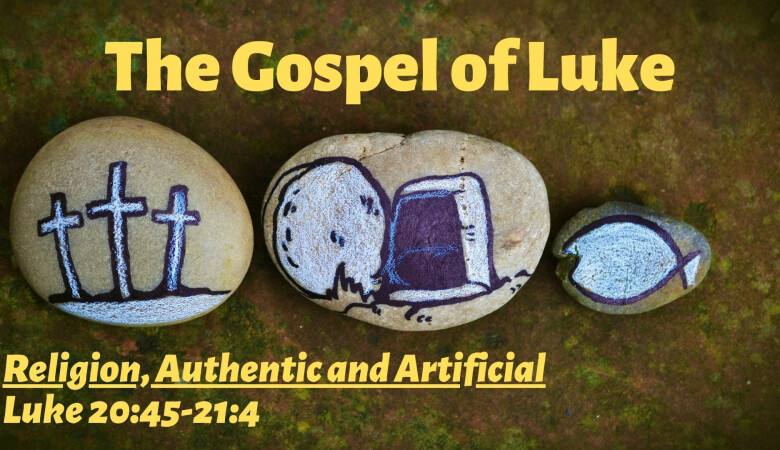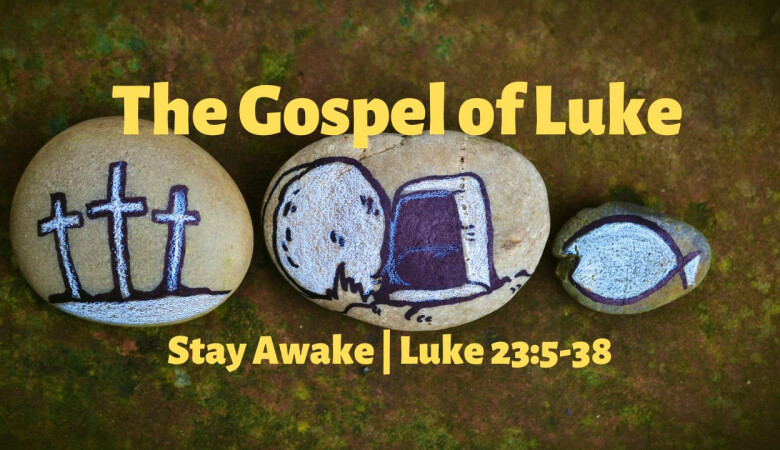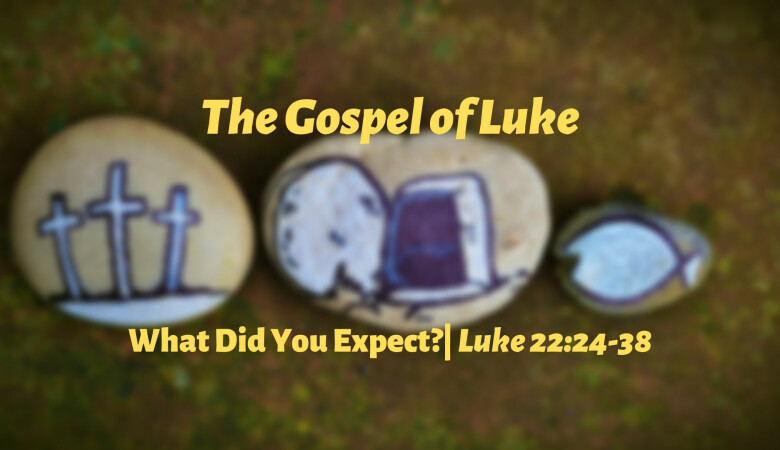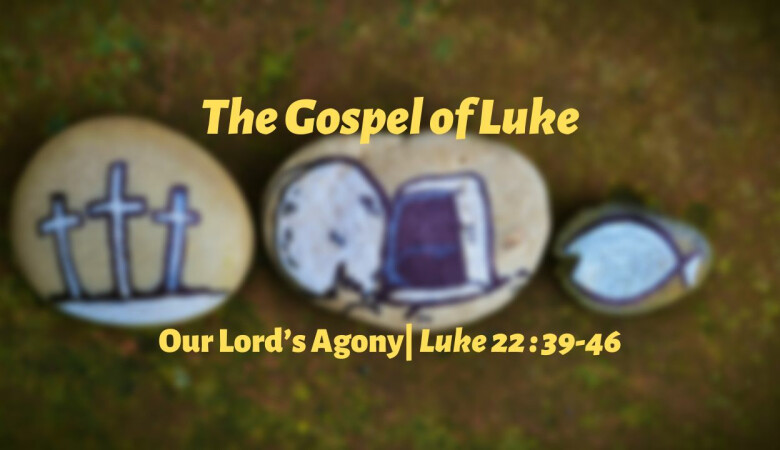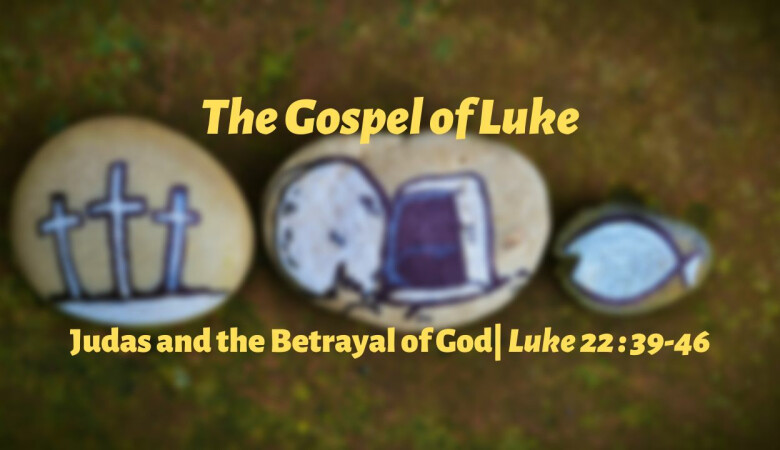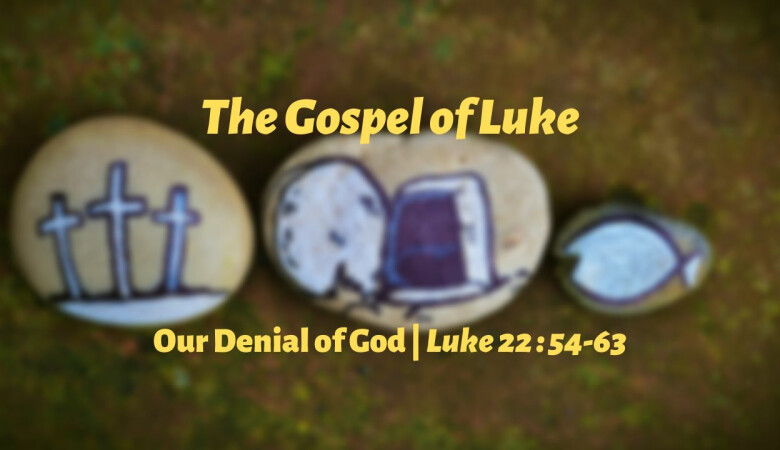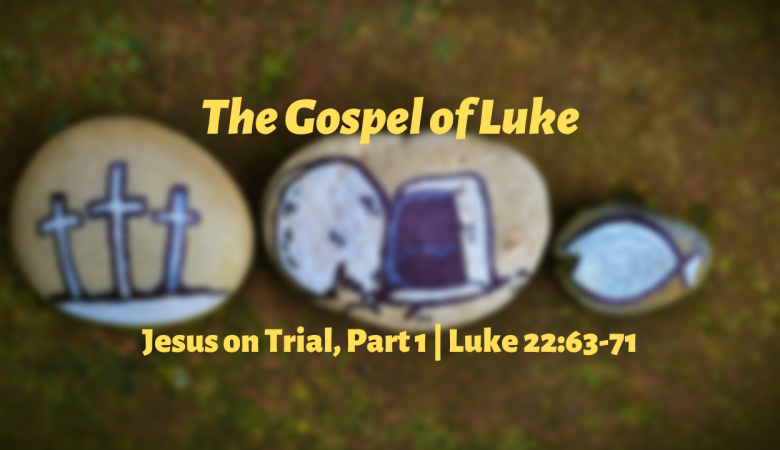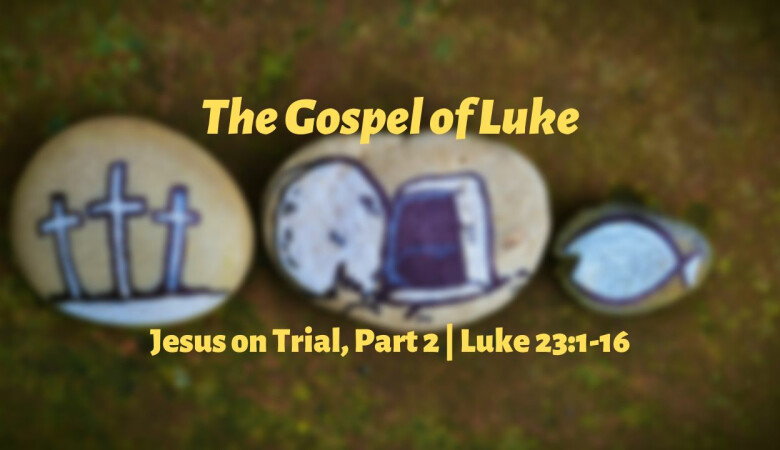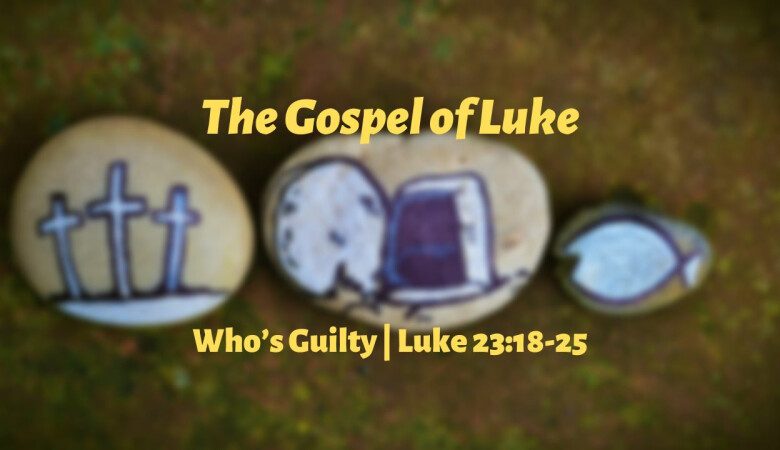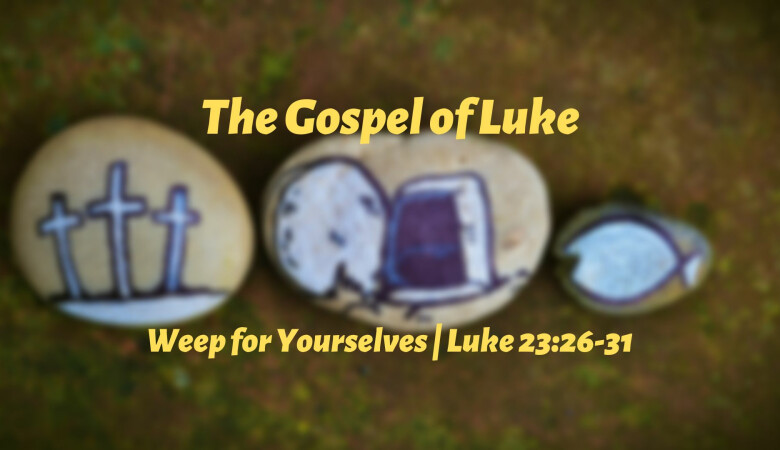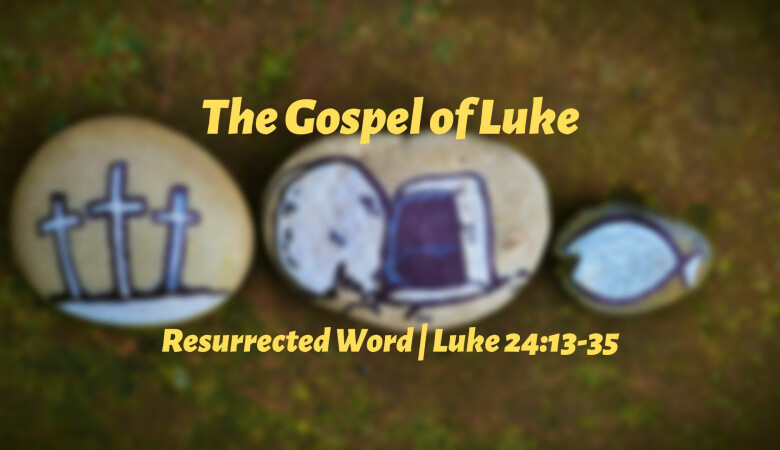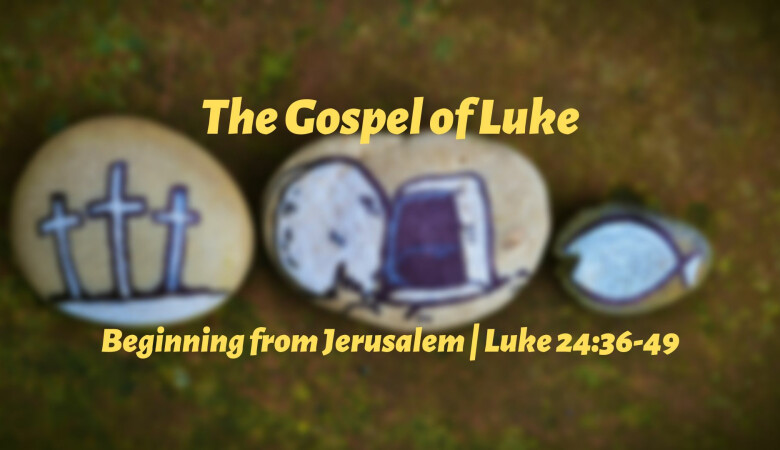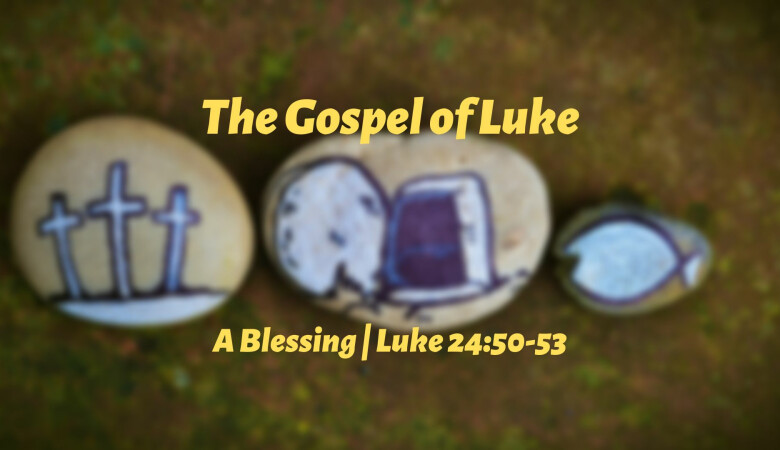Series: Luke
Resurrected Bread
April 14, 2024 | Peter Rowan
Passage: Luke 24:13-35
ALL SERMONS IN SERIES
Summary
It is very easy to get lost in the theological ramifications of Jesus’ death and miss the perspective of those who witnessed his crucifixion in all of its gory spectacle. As they walked home from Jerusalem, after Jesus’ death, Cleopas and Mary were most likely emotionally overwhelmed. Despair was companion when they meet one whom they did not at first recognize. In describing Himself in the scriptures He would enter their despair, and showing them what a “body broken” means.
Transcript
Lord in heaven, we thank you for this lovely passage. These disciples who came, uh, to encounter you as the resurrected one. And God, I pray that, uh, as they did that long ago, we here would do that today. Um, God, many of us believe, and yet we think how necessary and how appropriate. The prayer that was prayed long ago by the centurion, Lord, we believe, help our unbelief is to us even today. No, uh, doubt. Some of us here in this room and some of us may be watching online would describe ourselves less in a place of belief and more in a place of great doubt and questioning.
And I pray that as we enter into this text, that some of those doubts and some of those questions maybe just the discouragement of a long life of faith, that we wonder where the fruitfulness of it is, um, would be moved in greater belief of you, God. Wherever we are with, uh, this resurrection story today, uh, give, uh, us a greater sense that there is hope in Christ, that because of the resurrection, uh, we are a people. Christians are a people of hope and not despair. That we can acknowledge the brokenness of the world, um, how ugly and awful it can be at times. But, Lord, that we are a people whose lives, whose hearts, whose minds are shaped by this truth. Christ rose from the dead. Speak, uh, to us now, lord, please. Amen.
Okay. I told you last week, we're going to look at this story two, uh, weeks in a row, partly because it is just one of my favorite stories. Gotta be careful with saying my favorite. Um, but also because. Well, two other reasons. Uh, one, because I was just literally planning out the sermons through April, and I kind of needed to get two out of this one. It's part of it. The other thing, though, is that there's two great things going on in this story. One, the first half of it is largely focusing our attention towards the necessity of the word, the word of God, and how that instructs us and gives us hope in this life. And then the other one, right? Because he opens to them in all the scriptures, the things concerning himself, and then the other one is the bread and the sacrament. And Christians have always put these two things together, and I think sometimes we're inclined to lift up one, and actually, as we lift up one, the other one gets discarded, or at least put down a little bit. And I want to lift both these things up, in a way.
Anyway, we're, again, this, uh, morning in this story of Cleopas and his companion, as they have left Jerusalem and they're making their way back home, uh, to Emmaus probably. Almost certainly. They had made their way from Emmaus to Jerusalem initially. Because they were, uh, faithful Jews. And they would have been celebrating the Passover. And they were living fairly close, and so they would have made that journey to the Passover. But what is very certain from our text is that they weren't just faithful Jews who were celebrating the Passover. They were there to see Jesus. Right. They were interested in Jesus. They were disciples on some level of Jesus. Um, this interest that they have in Jesus, by the way, is not sort of a passing interest. Um, you know, some of you are probably going to see the Harrisburg, uh, Halfity Half Marathon that happens today. Um, I have a very passing interest in that. Uh, if they pass me by, I'll be interested for a moment. That'll be it. Um, Cleopas and his companions certainly did not have this kind of interest in Jesus. Um, most people believe, and I think there's really good warrant to believe this, that Cleopas was the same Cleopatra I mentioned last week. Who's referenced in John, chapter 19, as Clopas, as the husband of Mary, who is at the foot of the cross of Jesus. Along with Mary Magdalene and Mary, the mother of Jesus. It is very likely that these are very, very devout disciples of our Lord.
They had placed their hope for, uh, a better world, for a changed life, for a changed situation, um, in this one, in this Jesus. And the truth is that they had seen him die. They were very likely at the foot of the cross when Jesus side was pierced. When he finally gave his last breath and died, and the curtain was torn in two. They had witnessed his body break, his breath expire. And they had seen that kind of thing throughout their lives. Destruction and decay, the crumbling of the world, right? The breaking of something. They knew how final that kind of thing was. And, uh, maybe at that moment there, as they looked upon him hanging on the cross, um, maybe their minds thought of how they at least heard rumblings. Or maybe actually, some people think maybe they were actually in the upper room. Jesus gives his meal to his disciples. But there were plenty of other people that were very close to him. Like his mother in Jerusalem. Maybe there were others in that setting. And they were seeing him, his body, broken there on the cross. And maybe they were remembering just the night before. How he had taken bread and he had broken it. And he said, this is my body, which is broken for you. But as he hangs up on the cross and his body is broken, my guess is they didn't really see how that was for them, they're just thinking the finality of death and the on looming despair that accompanies death and the sorrow that accompanies death. And the destruction of their hopes for actually something better, right? Instead, his body, broken, seemed to tell them what they had often thought, which is death is normal, and it's just the way the world goes. And the powerful subjugate those under them by whatever means they have to do that and all that kind of way of living in the world. So as we read, as they make their way back to Emmaus, what you read is they talked about it, and they discussed the things that had happened in Jerusalem, the things that they had seen on this dusty road back. And one of the things I noted last week is that their eyes weren't open to see him. But I want to suggest to you that they were actually just, uh, they had their heads down because they thought we'd hoped here and our hope had been taken away. So this stranger comes up to them, who has the nerve to ask them what they're talking about, which does take a lot of courage. You know, somebody has their head down, you're like, hey, what's up? That's not normal. Um, and they describe to this stranger the things that they had seen, the things that had taken place in Jerusalem. And what they do is they unveil their hearts a little bit. We'd hoped for this. We'd hoped for this. Uh, what they are experiencing in that moment, I want to suggest to you, is, um, a type of dystopia, a future prospect that is only grim, that is only dark, that is only death. Uh, a future where the state of society was one of great suffering and a lack of hope, one of great injustice, one where death seemed to walk around with them. Hopelessness reigning. Um, last week on NPR's show morning Edition, there was a short interview with Katherine Murdoch. Catherine, uh, Murdoch is an activist, she's a philanthropist. Uh, she's married to James Murdoch. And she is the daughter in law of Rupert Murdoch, who owns the Fox Corporation, the media mogul. Um, she's a trustee on, uh, the board for the Environmental Defense Fund. And she's the co founder of Quadrivium, of the Quadrivium foundation, which funds practical, evidence based solutions for critical societal problems. Um, which is to say she's, like, tremendously aware of the great needs of our world. And she's really actually given herself over, particularly to environmental concerns in her professional and philanthropic life. Um, so anyway, she's on this show on NPR because she had a new tv show that came out last week because she is the executive producer of this new show that's called a Brief History of the Future, which is a great title, a history of the future. Um, so it aired on PBS last week, and it's made by her studio that's called Futurific Studios. And what this show does is it travels around the world and it really tells stories of innovation and creativity to address some of the needs of our world so that we might actually have a more hopeful future. Um, she has this show, I guess the first one was about, uh, addressing the massive plastic issue that is over all of our oceans. Right? And how do we address this massive environmental problem that we have? And then she has one that's coming out, I think, this week, um, looking into the national parks and their creation and preservation and things like that.
Um, but what I found most interesting about this little interview is she gets into specifically why she's doing this project, why she started this tv show. So she says, beyond her long concern for environmental stewardship, the turning point of this project was when her daughter came to her. Her daughter, who's a teenager, came to her and told her that she had no hope for the future. She said, there is no hope for the future. And she thought, man, I'm this woman who's been working for years to pursue a hopeful future, and my very daughter is willing to say, I have no hope for the future. So Kathryn, uh, Murdoch sat her down and she tried to tell her about all the work she's doing. And, hey, look, I've got this project going, and this person's doing this really interesting thing here in the world and that. And there's so much hope for the future. And she said, I got nowhere with her daughter. And she thought, okay, why? She said, well, what are the stories that my daughter's hearing? What are the narratives? What are the stories that she's watching and reading? And she thought. Kathryn thought about how prevalent these dystopian pictures of the future are. Um, she said, think of the zombies of the Walking Dead and the last of us. Think of books and movies, the Hunger Games, Handmaid's Tale. She said, you basically cannot find a young adult movie or book that has been written tracing all the way back to the sixties that does not include either a superhero or dragons, which she said basically is totally fantastical. Uh, she said, that actually paints a picture of a hopeful future. She said, actually, it's been 60 years since there has been a movie or book that is really connected with young adults that does not have a dragon or a superhero that points a positive depiction, uh, of the future. This is what she said, really. The last time we dreamed of a better future was Star Trek. It was 1964. She said Star Trek did not present, uh, a dystopia, but a protopia. So dystopias are horrible, uh, presents a horrible future. Utopias present a perfect future, and protopias simply project a future that is hopeful. Um, so she's working on these movie projects, these tv shows. She said she's got some writers that are working on graphic novels. We have to give stories of hope for the future, for the sake of her child and for the sake of so many others. And, um, it's not hard to see why this is a noble endeavor. Think, uh, about this. If you turn on your news, or if you scroll through your news, much of it owned by her father in law, Rupert Murdoch, nearly everything you see or read will paint a very bleak picture of the future. Wars and rumors of war, right. The widening gap in our political system that means that parties seem to almost never be able to work towards some kind of compromise that's helpful. The widening wealth gap that so often leads to societal problems, massive questions regarding human sexuality. It's not hard to make a list that paints a picture of a very dystopian future. And think of this daughter coming to her mother and saying, I have no hope. I don't believe the future is going to be good at all. Um, some of you are familiar with, uh, Jonathan Haidt. He's a New York University professor of ethical leadership. He's a social psychologist. Um, probably some of you have read his book. Last week, he actually, uh, put out a new book, the anxious generation, how the great rewiring of childhood is causing an epidemic of mental illness. It sounds very bleak, doesn't it? Sounds very dystopian. Uh, and actually, he paints a picture, a very clear picture in that book of, uh, how dire our situation is. He's been talking about this for a while. Let me read to you a couple of statistics. Um, depression rates and anxiety, which were fairly stable in the two thousands, rose by more than 50% from 2010 to 2019. 50% in those nine years. For girls ten to 14, it rose 131%. 131%. Oh, sorry. Let me, uh, backtrack. Actually, the suicide rate increased by 48% for ages ten to 19. For girls, the suicide rate in ten to 14 year olds went up 131%. And what he says is, this isn't unique to the United States. It's actually widely across all developed countries. And he says, of course, the big culprit of this, um, according to him, was this thing that he says, we've done this societal experiment on our children with regards to social media. We've actually been experimenting on our kids, on what social media will do to them. Um, and so, of course, part of what he advocates is the delayed introduction of smartphones. And he says, if you give them a phone, don't give them ones that have social media, uh, access on them, or at least delay it until you can get to high school. Or he actually says, ideally about 16 or 17 developmentally. Um, and then he actually gives a few kind of concrete things. He says, behind this big problem, behind this massive shift in anxiety and suicide rates going up, he said, um, the big thing is that we must do things. Uh, we must look for ways to embed our children in stable, real life, flesh and blood communities. He said, let your kids play with other kids. Put them in intergenerational, uh, places where they can engage with one another. He says, what we deeply need is in the flesh communities. Or what will happen is statistics will just get worse. What I'm suggesting is that it's really easy to find this dystopian engagement with the world, to look out in the world and actually have the same experience that Cleopas here and Mary, his companion, had, kicking the dirt at their feet, going, we had hoped, but our hopes were dashed, and our future is taken from us. And, uh, so many other people are seeing this. This isn't a christian idea, right? People are seeing what is going on. We have this dystopian future, and some people are saying, this needs to change. And maybe we can change it through different narratives, or maybe we can change it through simple interactions with other people. And those are actually very noble endeavors. Um, the future often seems like Katherine Murdoch's daughter describes it, or maybe how you describe it, right? Kind of look at your world and you go, I don't know, what future do we have? We have a future where the power take and suppress. A future where the good are downtrodden, trodden under others feet, raised up to die. A future where bodies are broken, crumbled, and destroyed.
Let's get back to the story, though. So this is the couple that Jesus enters into, right. And comes alongside as they meet, make this long, dejected journey home. But then what we read is that Jesus there on the road, opened up the scriptures to them. And specifically, he taught them how the Christ, the long waited for one who would be sent by God must suffer, must enter into the suffering of the world. And it says specifically that he opened up to the scriptures, the things concerning himself. Verse 32 tells us this little, little detail that is so beautiful. Verse 32, they said to each other, did not our hearts burn within us while he talked to us on the road, while he opened to us the scriptures? There, there's this little insight into somehow something's going on inside of them. As Jesus walks alongside them and he sees it starts to say, God enters into the suffering, the dystopian reality of this world, the ugliness of it all. And my guess is, as they give this description of their hearts burning within them, what they're actually saying is, we want more. Lift us up more, give us a greater hope. Give us a sense that our hopes are not dashed, but they can come to some level of fruition. Um, and I mentioned this to the group that was, uh, praying before the service for you all that would come. The amazing thing. And it's mentioned twice in this passage, the amazing thing happens actually in the breaking of the bread. Let me read this for you. Okay. If you have your bibles, open them up. Uh, Luke 24 28, I want you to see this. So verse 28, I want to read to 31 1st. So they drew near to the village which they were going. He acted as if he were going farther. One of the funniest things jesus does in the Bible, I think. But they urged him strongly, saying, stay with us, for it's towards evening and the day is now far spent. So he went in to stay with them. When he was at table with them, he took the bread and blessed and broke it and gave it that taking, blessed, breaking, giving is the same order that we have in the sacrament when he does that. Um, and their eyes were opened and they recognized him. There's something that was different about the actual broken bread for them than just the great story of scripture through which their eyes were opened. Jump down to verse 33, it says, and they rose that same hour and returned to Jerusalem, and they found the eleven. And those who were with them gathered together, saying, the Lord has indeed, has risen, indeed, and has appeared to Simon. Then they told what had happened on the road. And remarkably, it doesn't say an amazing Bible study that they were given. Instead it says, and how he was known to them in the breaking of the bread. He was known to them in the breaking of the bread. My guess is if they were devout disciples, maybe they'd spent actually the last few years, maybe meeting up with Jesus crew and learning from him. And uh, maybe he had fed them along with the 5000 there that wonderful day when jesus took the loaves and the fish and multiplied it. Um, but I don't think that's what they were thinking back on. And I think Luke is very intense that he takes and he blesses, he breaks and he gives, which is not what he does necessarily. In the same way that feeding of the 5000, this is undeniably recalling for them what jesus had done at that famous Passover meal, that last supper. Jesus takes the bread and he breaks the bread and he says, this is my body broken for you. And what they had seen very possibly just three days earlier, we're not told exactly, but what we believe they had seen because they were right there at the foot of the cross with the other Marys was Jesus dying, his body broken. And because they're dejected and they're walking back they're thinking, I have no idea how that's for me. All they had seen is their dystopian view of the future get bigger and bigger. But as Jesus is right there with them again, taking bread and breaking it and blessing it and giving it, their eyes are opened and they believe they are changed in that moment. Um, what I'm suggesting to you is this despair that they have is alleviated by this fact that Jesus says, my body broken for you. Then there was no hope if he hadn't risen from the dead. But because he did, they received this broken bread. And as the real reality of Christ's body broken and it changed their view completely. What I'm suggesting to you is knowing and experiencing that Christ's body is broken for us is exactly what we need. That is the hope of our future. Um, sure. Right. Let's all make a pact together. You other parents here, let's all make a pact together that we're not going to give our kids smartphones for a long time. It'll make it easier on us. If some of you break this pact, I'm coming after you. It's going to make it really hard on my kids. Um, but I'm saying that's actually not what we really need. That's not the ultimate need that we have. What you ultimately need is the broken body of Christ. And to know that the broken body of Christ is not the final thing up there on the cross, but that his broken body is for you because he lives and he breaks it and he gives it to you. Let me just, um, suggest three reasons for this and then I'll close. Okay. First reason. First reason not 3rd, 1st reason the broken bread is a communal bread. Think back at, uh, Jonathan Hyatt's statement. Uh, right. He says children need one another. Make places for kids to play together. He says make spaces for kids to interact with older people. And the bread and the cup are for the church, the body of Christ. The church has always said that the sacrament is not something you do alone. It's to be instituted by a minister, it's to be given out to the congregation, it's to be overseen by the leaders in the session of the church. In our context, which is partly what I'm saying, is actually literally one of the best things you can do in your life for your mental well being, for the well being of your children, is show up to church literally, and take the bread and take the wine and talk to each other and make it your regular habit. Do not neglect the gathering of the saints. That's what Hebrews tells us. Don't do it when it's easy or convenient for you. Make it your habit and take the bread that's broken and take the cup. It is for the body of Christ and it is for your well being. It is participate in the community, especially the community of faith. So the broken bread is a communal act, and that's what's happening here. Right? Jesus takes and he gives. Actually, he doesn't ever do it just to one person, but here it's just a couple people.
Um, second thing I want you to see is the broken bread addresses the broken world. Um, the bread and the wine of Jesus body and blood do not present for us a utopia. Um, they don't do that. Okay. In fact, um, what they say is that God did not turn a blind eye on the mess of the world, on the sin of the world, on the suffering of the world. Um, what they say for us is that God himself was killed. There's no utopian situation here. Right. Um, the best thing that you can have when suffering is someone else walking through you, through it with you. And the very best thing you can have is the creator himself saying, you are not alone in this. I'm not turning an eye to it, I'm not denying it, I'm not glossing over it. I am entering into your suffering with you. And that is what you remember every time you come and you take the broken body and the shed blood at holy communion. Um, the christian message is that Jesus walks with them on the road to Emmaus, knowing their sadness and their despair. The broken bread and the poured out wine do not give us the opportunity to put on rose colored glasses in the midst of the suffering of the world. But neither do they also allow us to take a dystopian view of the future. They don't allow us to go those routes. Um, they allow us to live in the hope filled tension of a suffering world that does have a hopeful future. Okay. Uh, finally, I want you to see, um, that the broken bread here tells us that Jesus knows our broken hearts. I think it's very lovely that, um, Jesus is sitting there with them at their table, and he's walked with them, what it seems like, for quite a long while, and he's heard their sorrows, and he's specifically breaking it and giving it to them. So when you come forward and receive, or when you're at other churches, you receive it various ways. I want you to hear Jesus say, this is for you. You specifically. I know your broken heart. I know the fact that most of the world says, no hope, and Jesus says, this is not my way. I want to feed you in the midst of your sorrow. Okay. Uh, so those are three things. Um, the broken body is communal. Um, sorry. The broken bread is communal. The broken bread that addresses the plight of the world and the broken bread that speaks to us and our broken hearts. Now, what happens? And this is actually something that. This is common in scripture. What happens to Cleopas and his companion Mary? Do they just sit there in their dining room? They're like, man, that was awesome. No, they don't. No, they do not. Verse 33 tells us, and they rose that same hour and returned to Jerusalem. Maybe they sat there for, like, 50 minutes. They were like, oh, my goodness. What do we do? They're like, wait a second. We have to go back to the very place of our despair. We have to go back to the place where it seems like Rome is winning, right? We have to go back to the place of the cross and declare that this is not, uh, the final say. There is a hope for a different world. Don't buy the hopelessness. Don't buy it. There is a story in which God himself enters this world, and he comes among us, and he touches us, and he feeds us, and he engages with us as in the flesh, reality. And in so doing, he lifts us up. Uh, I read an article years ago by Anne Lamott, and she quoted Barbara Johnson. Barbara Johnson said, we are an Easter people living in a Good Friday world. And they caught that because they were people that, uh, at the beginning of that story, they were like, good Friday is all there is. Just like Katherine Murdoch's daughter. Good Friday is all there is. And by the end of that story, they said, we are an Easter people living in a Good Friday world. And we have to go back to that good Friday place. We have to go back to that place and say, he is risen. He rose. You do not have to despair. The weight of Rome and the weight of your social relationships and just frankly, the despair of looking through things and saying, man, this is awful. When that is overcoming you, you need one another to say, no, we are an Easter people. You may be living in a Good Friday place right up here, and we all do, right? But we are an Easter people living in this good Friday world. Brothers and sisters, we may live, uh, in a world that is characterized by the slow, steady, plodding and trotting of despair and hopelessness. Where the powerful always seem to win, where friendships are scattered, if they exist at all, and oftentimes estranged parents and children are torn apart. But to be an Easter people is to receive Jesus as the true risen one. Not to hide the brokenness, but to come and to feed on him and to receive from him that his body was broken and his blood was shed for you. Jesus dies for you. But more than that, he lives for you. And he feeds you with this very reality that he dies and he, uh, lives.
Let me pray for us. Lord, we know because we live in this world how, uh, hopeless sometimes things feel. We're not estranged from the life of our neighbors, their experience, and the experience, um, of some of these statistics, they don't pass us by. We read of wars and rumors of wars. We do read of how awful the environmental destruction that we have brought upon our world is. And so many other things. Lord, we all can recount stories of hopeless experiences. And so I pray that we would be a people and that we would invite others to be a people that come and taste of your goodness, that make it the habit of our life to feed on you. Not some ethereal Jesus, but the real one of this earth, uh, that feeds us with the things of this earth whose body was broken and whose blood was shed for us. And that. That fact of God's suffering for us and God coming and conquering the very place where we say death has victory changed us to be a people? We're Satan. Death wears your sting. God, would we second city church be a people. Be an Easter people. As Barbara Johnson said, living in this good Friday world, lights in the midst of darkness, hope in the midst of despair, God would be eager to encourage one another in the faith to spread this good news of Christ died. Christ risen, Christ coming again. God, move in us in these ways. Oh, how we need it. Oh, how the world needs it. We bless you this morning. We thank you for this word. Amen.
Series Information
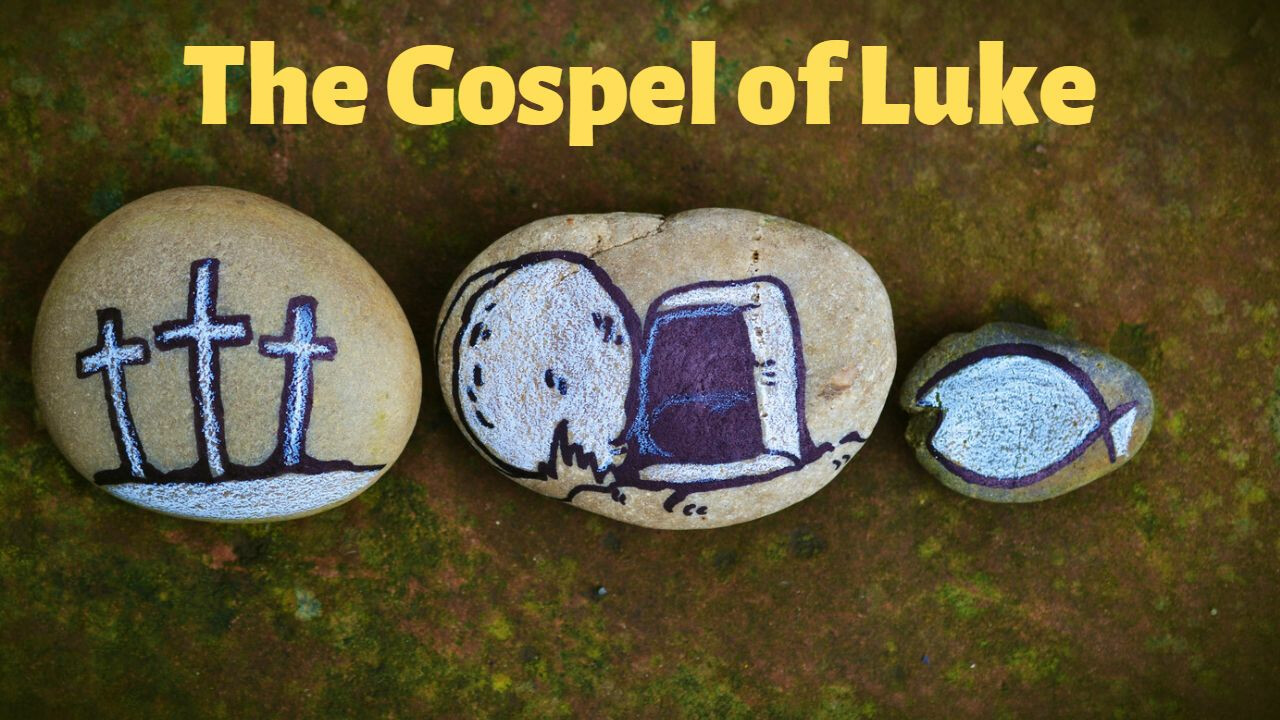
The Gospel of Luke is best described by its author in the first four verses of the book: "Many have undertaken to draw up an account of the things that have been fulfilled among us, just as they were handed down to us by those who from the first were eyewitnesses and servants of the word. With this in mind, since I myself have carefully investigated everything from the beginning, I too decided to write an orderly account for you, most excellent Theophilus, so that you may know the certainty of the things you have been taught."


